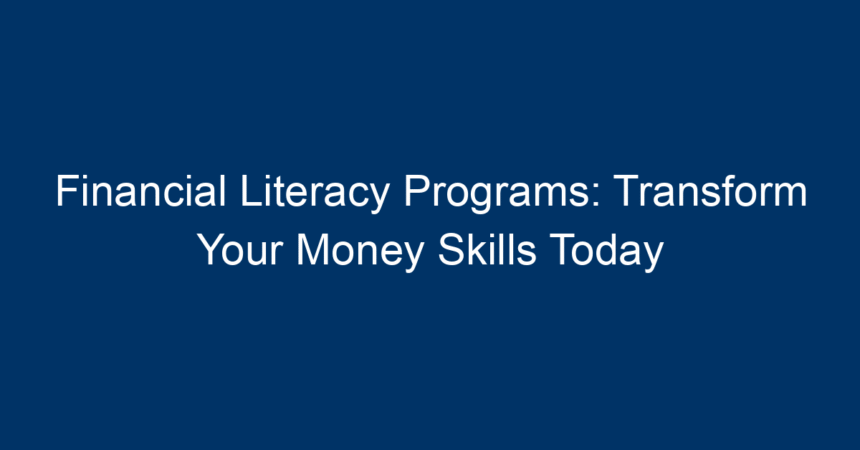In an ever-evolving financial landscape, understanding money management has never been more crucial. Whether you’re a student, a young professional just starting your career, or someone looking to navigate the complexities of investments, financial literacy programs can transform your money skills and empower you to make informed decisions. In this article, we’ll delve into what financial literacy programs entail, why they are essential, and how you can enroll in one to enhance your financial knowledge.
What Are Financial Literacy Programs?
Financial literacy programs are structured educational initiatives designed to equip individuals with the knowledge and skills necessary to make informed financial decisions. These programs cover a wide range of topics, including budgeting, saving, investing, debt management, and understanding credit. The goal is to foster a well-rounded understanding of personal finance, enabling participants to navigate various financial situations with confidence.
Why Financial Literacy Matters
-
Empowerment: Financial literacy programs provide individuals with the tools they need to take control of their financial future. By understanding how to manage money effectively, participants can make smarter financial choices.
-
Debt Management: Many people struggle with debt. A solid foundation in financial literacy helps individuals learn how to manage existing debts and avoid falling into financial pitfalls.
-
Investment Insights: Investing can be daunting for beginners. Financial literacy programs break down complex concepts, making it easier for individuals to understand investment options, risks, and strategies.
-
Building Wealth: Knowing how to save, invest, and plan for retirement is essential for building wealth over time. Financial literacy programs focus on long-term financial planning, encouraging participants to think beyond immediate financial needs.
- Staying Informed: The financial world is constantly changing, with new products and regulations emerging regularly. By participating in financial literacy programs, you stay informed about trends and best practices.
Core Components of Financial Literacy Programs
1. Budgeting Essentials
A cornerstone of financial literacy is the ability to create and stick to a budget. Effective budgeting helps you:
- Track Income and Expenses: Understand where your money goes each month.
- Set Financial Goals: Whether saving for a vacation or a home, budgeting allows you to allocate funds toward your goals.
- Avoid Overspending: Learn how to make informed choices about discretionary spending.
2. Saving Strategies
Saving is vital for financial health. Financial literacy programs teach various strategies, including:
- Emergency Funds: Establishing a safety net for unexpected expenses.
- High-Interest Savings Accounts: Finding the best accounts to grow your savings.
3. Understanding Credit
Your credit score can significantly impact your financial future. Programs often cover:
- How Credit Scores Work: Understand the factors that influence your score and how to maintain a healthy credit profile.
- Managing Credit Card Debt: Learn the dos and don’ts of credit card use to avoid crippling debt.
4. Investment Fundamentals
Investing can seem intimidating, but financial literacy programs simplify the process by teaching:
- Investment Vehicles: Stocks, bonds, mutual funds, and retirement accounts.
- Risk vs. Reward: Understanding the risk associated with different types of investments and how to balance your portfolio.
5. Retirement Planning
It’s never too early to start planning for retirement. Programs focus on:
- Retirement Accounts: 401(k)s, IRAs, and their benefits.
- Calculating Retirement Needs: How to determine how much you’ll need to save to enjoy a comfortable retirement.
Different Types of Financial Literacy Programs
1. Online Courses
Many organizations offer online courses that can be completed at your own pace. These courses often include:
- Videos
- Interactive quizzes
- Downloadable resources
2. Workshops and Seminars
Financial literacy workshops and seminars are often offered by community organizations, schools, and financial institutions. These events provide:
- Interactive discussions
- Networking opportunities
- Expert insights
3. One-on-One Coaching
For personalized guidance, consider financial coaching. Coaches work with you to create a tailored plan to improve your financial literacy.
4. School Curriculum
Many educational institutions are now incorporating financial literacy into their curricula. Programs aimed at children and young adults focus on foundational concepts that set the stage for future financial success.
How to Choose the Right Financial Literacy Program
When selecting a financial literacy program, consider the following factors:
1. Your Financial Goals
Identify your financial goals. Do you want to learn about budgeting, saving, investing, or all of the above? This will help you choose a program that aligns with your needs.
2. Reviews and Credentials
Research the provider of the program. Look for reviews from past participants and check their credentials. Programs offered by accredited institutions often provide higher-quality content.
3. Program Format
Different formats work for different learning styles. Decide whether you prefer online courses, in-person workshops, or one-on-one coaching.
4. Cost
While some programs are free, others may charge fees. Consider your budget and weigh it against the value of the education you’re receiving.
Actionable Tips to Enhance Your Financial Literacy Today
-
Start Small: Begin with the basics—create a budget or open a savings account. Small actions lead to lasting habits.
-
Seek Resources: Utilize resources like books, podcasts, and websites dedicated to personal finance.
-
Ask Questions: Whether at workshops or online forums, don’t hesitate to ask questions and seek clarification on topics you find challenging.
-
Practice Regularly: Apply what you learn in real-life situations. The more you practice, the more confident you’ll become in your financial skills.
- Join a Community: Networking with others who share your goals can provide encouragement and new insights.
Conclusion
Financial literacy is an invaluable skill set that can transform your relationship with money. By participating in financial literacy programs, you not only empower yourself but also pave the way for a more secure financial future. As you take steps to enhance your financial knowledge, remember that every small effort counts. Choose a program that resonates with your goals, commit to learning, and watch your money skills flourish. Start your journey today; your future self will thank you.




